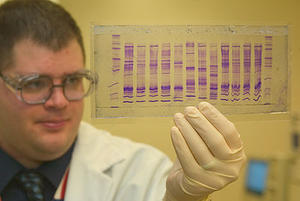ForensicsForensic familial DNA searches carry risk of certain false matches
DNA-based familial search may misidentify distant relatives of known offenders as close relatives. Familial searches can reliably distinguish first-degree relatives from unrelated individuals, but may misidentify distant relatives as being immediate family, according to this new research.

Familial search techniques weaker than first believed // Source: commons.wikimedia.org
Forensic DNA-based familial search methods may mistakenly identify individuals in a database as siblings or parents of an unknown perpetrator, when in fact they are distant relatives, according to research published 14 August in PLOS ONE by Rori Rohlfs and colleagues from the University of California at Berkeley and New York University.
A PLOS ONE release reports that familial searching is a new forensic technique to identify a perpetrator if a crime scene DNA sample has no matches in a DNA database. In such a situation, law enforcement can look for a partial match to a known person in the database — a “near miss” — in the hope that the closeness of the genetic profiles indicates that one of that person’s relatives is the perpetrator. Familial searches can reliably distinguish first-degree relatives from unrelated individuals, but may misidentify distant relatives as being immediate family, according to this new research. As a result, second cousins, half- siblings and other relatives may be identified as siblings. The results suggest a 3-18 percent chance that a first cousin of a known offender could be misidentified as a full-sibling using current techniques, and up to a 42 percent chance that a half-sibling could be misidentified as a full-sibling.
The authors conclude that there exist two unanticipated likely outcomes of familial search policies. The study explains these as, “Investigations may wrongly target the immediate families of known offenders, because officers mistakenly believe that their lead is a first-degree relative. Second, investigations may ultimately probe far more deeply than initially imagined, because once officers are convinced that the source cannot be found among first degree relatives, they will widen their net of investigation to include more distant relations. Both of these consequences exacerbate the numerous ethical problems presented by familial searching.”
— Read more in R. V. Rohlfs et al., “The Influence of Relatives on the Efficiency and Error Rate of Familial Searching,” PLOS ONE 8, no. 8 (14 August 2013): e70495 (doi:10.1371/journal.pone.0070495)
